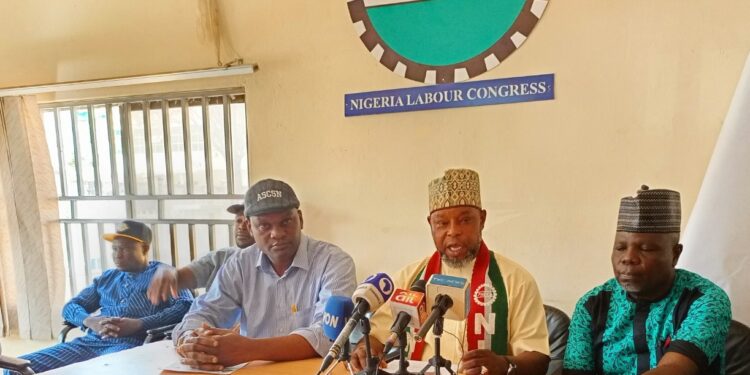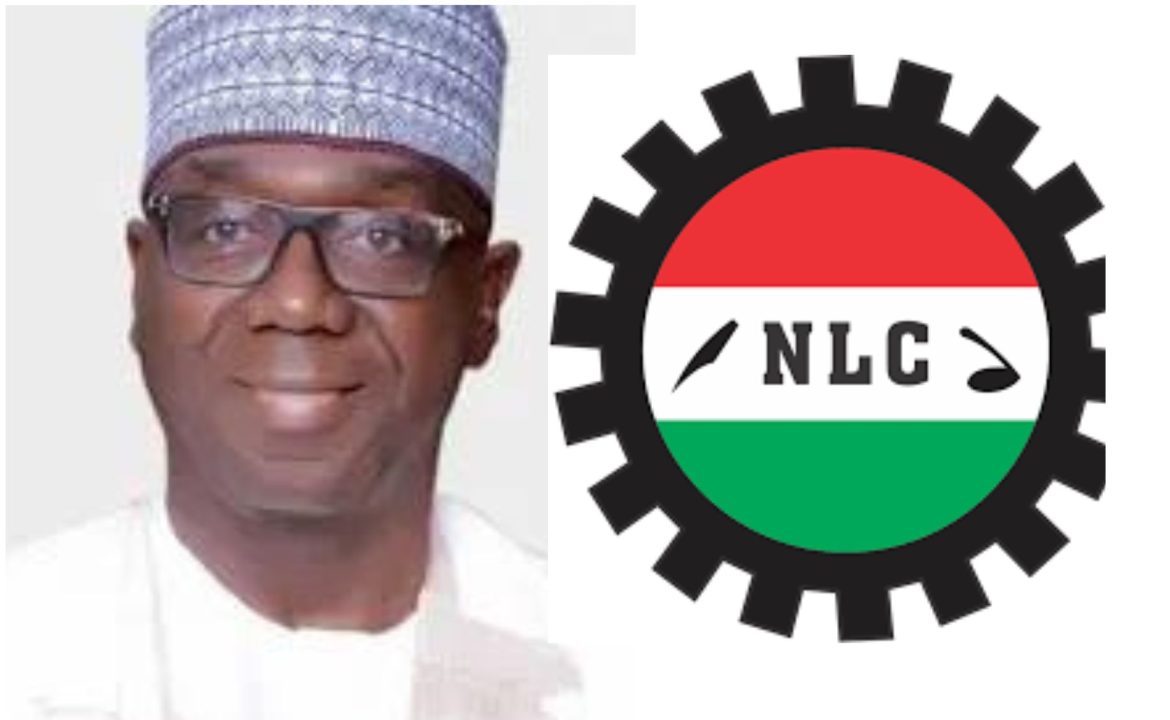By Omotayo Ayanda
In a sudden turn of events, the once peaceful relationship between Kwara State’s Labour Unions and the Government has drastically changed. What was once a landscape of mutual appreciation and support has now evolved into a battleground of grievances and unmet promises. The Joint Kwara Labour Congress, representing public workers, has issued an assertive 14-day ultimatum to the State Government, marking a significant departure from their previous camaraderie.
This abrupt shift in tone and stance of the Labour Leaders raises questions, particularly regarding their discontentment with the Government’s handling of essential matters, notably the issue of Wage Award and a spectrum of unaddressed concerns.
The once harmonious phase witnessed the Labour Leaders extending public support, acknowledging the Government’s initiatives, and praising efforts aimed at fostering progress and welfare in Kwara State. However, this initial camaraderie has seemingly evaporated, giving way to a demand-driven ultimatum fraught with unmet expectations and broken agreements.
During this era of mutual admiration and endorsement between the Labour Leaders and the Government, the Joint Kwara Labour Congress consistently expressed solidarity and commendation for the Government’s policies and initiatives aimed at bolstering the welfare of workers and advancing the state’s development.
Labour Leaders, including the State Chairman of the Nigeria Labour Congress (NLC), Comrade Muritala Saheed, and counterparts from various Unions, openly lauded the Government’s strides in fostering progress across formal and informal sectors. Their public statements echoed the sentiments of cooperation, appreciating the efforts undertaken by the Government to improve the conditions of workers in Kwara State.
Expressions of support were not merely rhetorical but manifested through joint efforts and collaborations between the Labour Unions and the Government. These collaborations aimed at enhancing working conditions, instituting fair wage policies, and advancing the rights of employees in various sectors. The Labour Leaders were vocal in their appreciation, acknowledging the Government’s initiatives as steps in the right direction towards ensuring the well-being of the workforce.
During this phase, the atmosphere appeared conducive to dialogue and constructive engagement between the Government and the Labour Unions. The leaders, in their public engagements, were often seen acknowledging and endorsing the Government’s commitments to address the challenges facing workers, fostering an environment of mutual understanding and cooperation.

However, this phase of mutual admiration and endorsement eventually metamorphosed into a situation marked by discontent and dissatisfaction among the Labour Leaders, culminating in the issuance of a firm ultimatum to the Government. The transition from praise to protest is an intriguing shift that has prompted a reevaluation of the factors influencing this notable change in stance.
The present conflict brewing between Kwara State’s Labour Unions and the Government stands as a testament to a rift that has widened due to unmet expectations, broken promises, and a multitude of unresolved issues plaguing the workforce.
Investigation by Daily Links reveled that the ultimatum issued by the Joint Kwara Labour Congress paints a vivid picture of the grievances accumulated over time. At the heart of this conflict lies a series of demands that have remained unaddressed, undermining the trust and goodwill once shared between the Labour Leaders and the Government.
Foremost among the grievances is the Governor Abdulrazaq led Government’s failure to implement the N35,000 Wage Award for all categories of workers in Kwara State following the removal of fuel subsidy. This unfulfilled promise has left workers disillusioned and financially strained, contradicting assurances made in the past.
Furthermore, the Government’s reluctance to domesticate and implement the approved 40% peculiar allowance as provided by the Federal Government of Nigeria stands as another flashpoint in the brewing conflict. This refusal to align with Federal directives has added fuel to the simmering discontent among the state’s workforce.
According to the Labour Leaders, Pensioners were also left in the lurch, as the non-payment of consequential adjustments since the approval of the current New Minimum Wage in 2019 has significantly impacted their livelihoods. The arrears owed to local government workers, outstanding promotions for 2020, 2021, and 2022, along with other unresolved issues, further compound the grievances of the Labour Unions.
Health workers at the Local Government level, who have been at the forefront, especially during the challenging times of the pandemic, continue to grapple with the non-implementation of 100% CONHESS and 100% Hazard Allowance. This oversight in recognizing their dedication and service adds to the mounting frustrations.
Moreover, the inadequate funding of State-owned Tertiary Institutions and the failure to implement 100% CONPASS and CONTEDISS for workers in these Institutions contribute significantly to the discontentment among the Labour Unions.
The plight of Kwara Hotel Workers, lacking proper placement without conditions, and the yet-to-be addressed proper placement of redeployed Kwara Water Corporation Staff into the service of Kwara Core Civil Service are additional issues feeding into the present conflict.
Speaking with Daily Links, a Labour Leader in the State, Comrade Surajudeen Babajide noted that the list of unmet promises and unresolved matters eroded the confidence of the Labour Unions in the Government’s commitment to the welfare of workers in Kwara State. “The accumulation of these grievances has precipitated the issuance of the ultimatum, signifying the tipping point in a long-drawn struggle for workers’ rights and fair treatment”.
According to Adetunji Bojuade, a social analyst, “the implementation of actions by the Labour force, particularly the issuance of ultimatums or protests, against the backdrop of Governor Abdulrahaman Abdulrazaq’s position as the Chairman of the Nigeria Governors’ Forum (NGF) could potentially yield negative implications for both the Governor and Kwara State.
“Any public discord or confrontation between the workforce in Kwara State and Governor Abdulrazaq could diminish his national influence as Chairman of NGF. It might portray an image of internal instability or conflict within his governance, potentially impacting his effectiveness in leading National discussions and negotiations.
“Strained relations with the Labour Leaders in Kwara State might affect the NGF dynamics, influencing Governor Abdulrazaq’s ability to foster consensus and unity among governors on National issues. It might weaken his leadership position within the NGF, hindering effective coordination and representation of State interests”, he said.
Another public analyst, Barrister James Ogunmola said that protests or unrest might create an image of instability, potentially affecting investor perception and economic activities within Kwara State. It might deter investment and economic growth if the situation persists, impacting the State’s development and prosperity.
Ogunmola added that, “continued conflicts with Labour Leaders could divert the Government’s focus and resources away from developmental initiatives and policies, affecting the state’s progress and ability to address pressing socio-economic issues”.
In essence, while the change in stance may seem contradictory, delving deeper reveals a spectrum of factors influencing the Labour Leaders’ actions. Whether it signifies a principled stand or veers into the territory of hypocrisy remains a matter of interpretation shaped by the intricate interplay of politics, advocacy, and the genuine pursuit of workers’ welfare.
The evolving narrative between Kwara State’s Labour Unions and the Government underscores the need for a reflective conclusion, emphasizing the urgency of dialogue, transparency, and collaborative efforts to address the underlying issues and pave the way for meaningful resolution.
Finding common ground amidst fiscal constraints requires innovative solutions and a commitment to exploring avenues for sustainable compromises. Bridging the gap between promises and delivery demands a genuine commitment to fulfilling obligations and honoring agreements made with the workforce.
In conclusion, the transformation from praise to protest by the Labour Unions in Kwara State serves as a clarion call for urgent action. It underscores the need for a collaborative approach that places the welfare of workers at the forefront of governance. By fostering genuine dialogue, addressing grievances, and prioritizing the well-being of the workforce, Kwara State can forge a path towards sustainable development, social harmony, and a more equitable future for all its citizens.
